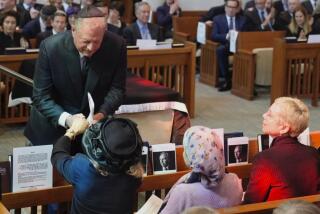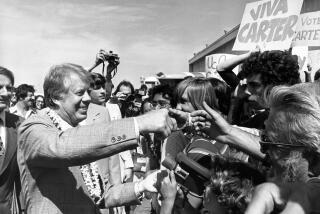Clinton-Gore: Chumminess Is Unexpected : Campaign: Their close working relationship is viewed as unique. But some question whether the friendship and trust would last if they were elected.
- Share via
DULUTH, Minn. — Al Gore is on the verge of dissolving into tears, his contorted face a study in pain and regret. Yes, the Tennessee senator slowly nods, he most certainly rues not having sought the Democratic presidential nomination himself this year.
In seconds, he recovers. It’s been a put-on. And no one laughs louder than Gore as his charter jet descends through the clouds into Duluth for another rally, where he would once more praise to high heaven his new best pal and the man who tabbed him as his running mate on the Democratic presidential ticket, Bill Clinton.
As the two men barnstorm across America, together and separately, their personal affinity for one another has become a striking and wholly unexpected dynamic in the 1992 presidential race.
“I miss Bill!” Gore gushes. “We really like each other!”
Such a warm and close working relationship between running mates--not to mention their wives--is extraordinary. And if the Clinton-Gore ticket should win in November, theirs could be among the most unique relationships in White House history.
“It’s fairly remarkable to have two guys with similar ages (Clinton is 45, Gore 44) and similar ambitions get along so well--without any conflicts,” says a campaign official who advises both men. “It could transform how vice presidents are perceived.”
But others question whether the friendship and trust that has blossomed between Clinton and Gore can endure if they are elected.
“This free and easy equality in the campaign just can’t be characteristic of a relationship between a President and a vice president,” says Harvard historian Richard E. Neustadt, a presidential scholar. “That has nothing to do with them as individuals but with the total disparity between their governmental authority and powers.”
Gore, while insisting he is “under no illusions” about the differences between the two jobs he and Clinton are seeking, still believes the relationship they’ve formed will last--and work.
“I have a theory about that,” Gore said in an interview. “When two people both work toward the same set of goals, and those goals are larger than either one of them, it automatically produces a certain closeness and rapport.”
Gore clearly has emerged as a force in the Democratic campaign.
For instance, while many of Clinton’s other advisers were urging him to adopt a more cautious, wait-and-see approach on the ethnic strife in Bosnia, it was Gore who buttressed the Arkansas governor’s own inclination to call for a greater United States role in ending the violence.
And because Clinton has few foreign policy credentials, he has been looking to Gore, a member of the Senate Armed Services Committee, to speak freely on international affairs. Clinton also made a point of bringing Gore with him to his Wednesday meeting in Washington with newly elected Israeli Prime Minister Yitzhak Rabin.
Clinton similarly has allowed Gore to take the lead on environmental issues, since the Tennessee senator is widely regarded as a leader in the movement.
“They really trust each other’s judgment and instincts,” said one Gore adviser. “I think it makes Clinton more confident.”
Gore demurs from that point. “I’ve not noticed any lack of confidence on his part,” he said. “We both learn from each other. I’ve learned a lot in listening to him.”
Bob D. Squier, a veteran Democratic operative, is intrigued by the difference in the two men’s background of public service: Clinton’s has been largely in the executive branch while Gore’s has been in the legislative branch.
“They have very different areas of expertise and, to me, the most interesting thing is how they probe each other’s minds,” said Squier, a longtime friend of the Gore family. “It’s like they pull things out of each other. It’s really fun to watch. There’s a real meeting of the minds.”
Rodney Slater, a senior Clinton adviser, agrees. “They really complement each other very well. There is genuine respect. And both share a sense of where the country is and what must be done.”
The Clinton-Gore chemistry surprised other campaign aides as well.
“I don’t think anyone could have predicted or anticipated how well they’d get along,” said Mark Gearan, a key Clinton adviser who now travels with Gore.
Gearan added that typically in a campaign, events conspire against such a bonding. “Usually, you come right out of the convention into a massive fishbowl, and you’re campaigning--in separate planes--at the speed of light, trying to talk, trying to merge staffs and messages.”
But the two post-convention Clinton-Gore bus trips--a third is to start next week--gave them a chance to cement what has become a very public mutual admiration society.
“We talked about everything--our children, sports, policy, everything,” recalled Gore.
Although they are from neighboring states, Clinton and Gore did not have what Gore calls “our first substantive conversation” until 1987. At the time, Gore was hotly pursuing the party’s 1988 presidential nomination and went to the governor’s mansion in Little Rock to seek Clinton’s endorsement.
“The conversation quickly went to another level as we discussed our shared dreams for the future of this country and the particular problems that we had tried to deal with,” Gore says. “And we really hit it off right away.”
A Clinton endorsement never came Gore’s way, but he won the Arkansas primary anyway, only to falter soon afterward as Michael S. Dukakis claimed the 1988 nomination.
Clinton and Gore did not have another extended conversation until June 30 of this year. It was on that day that Clinton--in search of a running mate--invited Gore to his hotel room in Washington for a 10 p.m. meeting.
“It was almost as if it picked up where the other conversation left off--the future of the country, the meaning of a partnership, how two people can work together most effectively,” Gore said.
The meeting was scheduled to last an hour. It ran 3 1/2 hours.
Meantime, their wives--Hillary Clinton and Mary Elizabeth (Tipper) Gore--also seem to be hitting it off famously. “And that’s very important too,” said Squier.
The senator, who has made no secret of his burning desire to become President one day, said he has easily reconciled himself to the role of second banana.
Having failed in his earlier presidential bid, the chance to run on the party’s ticket “has a deeper meaning,” Gore said. He added: “The job now is very simply to do everything possible to help Bill.”
More to Read
Get the L.A. Times Politics newsletter
Deeply reported insights into legislation, politics and policy from Sacramento, Washington and beyond. In your inbox twice per week.
You may occasionally receive promotional content from the Los Angeles Times.










